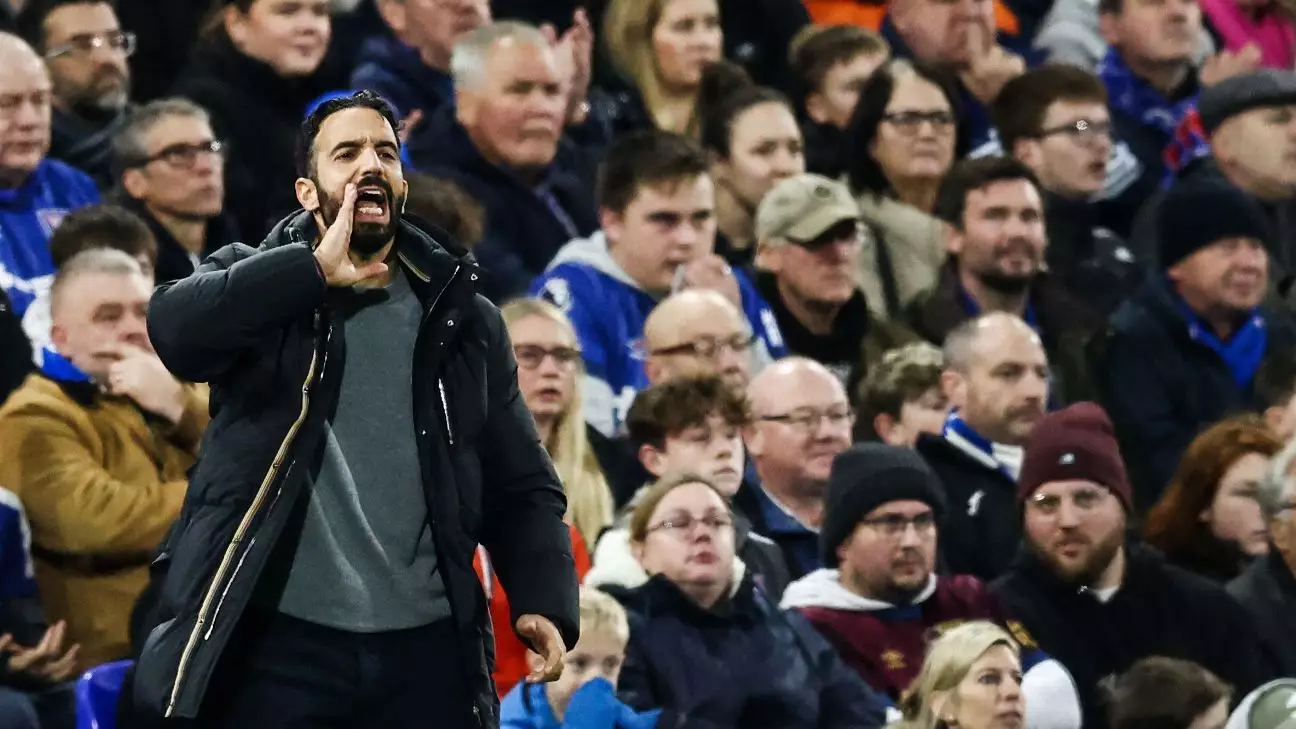In the sport of football, a team’s performance is often a reflection of its coaching staff and their philosophies. The recent appointment of Ruben Amorim as Manchester United’s head coach marks a pivotal moment for a club striving to regain its former glory. Amorim’s inaugural match against Ipswich Town revealed both the promise and peril of the path ahead. The confidence that both fans and players felt quickly gave way to the harsh realities of transformation in the footballing world.
The dream of success at United took flight during the early moments of the match when Marcus Rashford’s goal within the first two minutes seemed to signal a bright beginning. However, this early triumph did not hold; soon, Amorim’s new squad found themselves backtracking as Hutchinson’s incredible equalizer thwarted their initial momentum. The draw highlighted the intricate challenges Amorim faces, foreshadowing the uphill battle in reinvigorating a team that has lingered in mediocrity for far too long. The stark contrast between the exuberance of Rashford’s early goal and the frustration that ensued painted a vivid picture of a squad lacking cohesion and direction.
Amorim’s visible frustration with Joshua Zirkzee, who appeared disinterested rather than proactive in seeking victory, epitomizes a deeper malaise infecting Old Trafford. It raises questions about the mentality embedded in the club. When a head coach has to remind a forward about the importance of aggression in pursuing a winning goal, it signals a worrying cultural stagnation. Amorim, who previously ignited Sporting CP’s resurgence, now finds himself tasked with shifting not just tactics, but also mindsets.
He will need to grapple with the remnants of fear and uncertainty that have permeated the squad, stemming from tenure under Erik ten Hag’s management. The players’ hesitancy and overthinking on the pitch, as Amorim observed, underscore the psychological weight they carry. To foster a culture of confidence, he must instill a belief in both the methodology and the players’ individual capabilities.
Amorim’s comments post-match were telling; he emphasized the need for patience as the team navigates a steep learning curve. After merely two to three days of training under his guidance, asking players to adapt to a new tactical framework was arguably ambitious. Fans yearning for immediate results must understand that transformation is not instantaneous; it requires sustained effort and time.
The reality of his selection choices, particularly deploying experienced players like Casemiro and Eriksen in the midfield, brings to light the limited resources available to Amorim. These decisions illustrate the long-term ramifications of previous mismanagement in the transfer market that have left United reliant on aging players. The lack of energy in key areas of the pitch facilitated Ipswich’s encroachment, further exposing the tactical limitations of the current squad.
While the match may not have delivered the debut win Amorim envisioned, the fundamental understanding of positioning and responsibilities from his players provides a foundation for building on. The struggles evident in the Ipswich match can be attributed, in part, to the inherited challenges of the squad. Shifting players’ understanding and physical readiness to align with Amorim’s vision will take concentrated effort on the training ground.
Moving forward, it is crucial for Amorim to focus on creating an agile squad that embodies the dynamism he has celebrated in past coaching tenures. The tactical flexibility showcased in his time at Sporting CP must be adapted to rekindle United’s competitive spirit. While his five substitutions in the second half may not have brought immediate results, they underscore a commitment to experimentation and evolution—key elements in any rebuilding phase.
The journey that Ruben Amorim has embarked on with Manchester United will undoubtedly be tumultuous. Yet, it is also laden with potential. The draw with Ipswich Town may have left a bitter taste, but it reveals the extensive work ahead. Supporters must remain anchored in their sentiments, acknowledging that monumental change takes time. With perseverance and strategic planning, Amorim can pave the way for a revived Manchester United, transforming current woes into a hopeful narrative of resurgence and excellence for a club that demands greatness.
